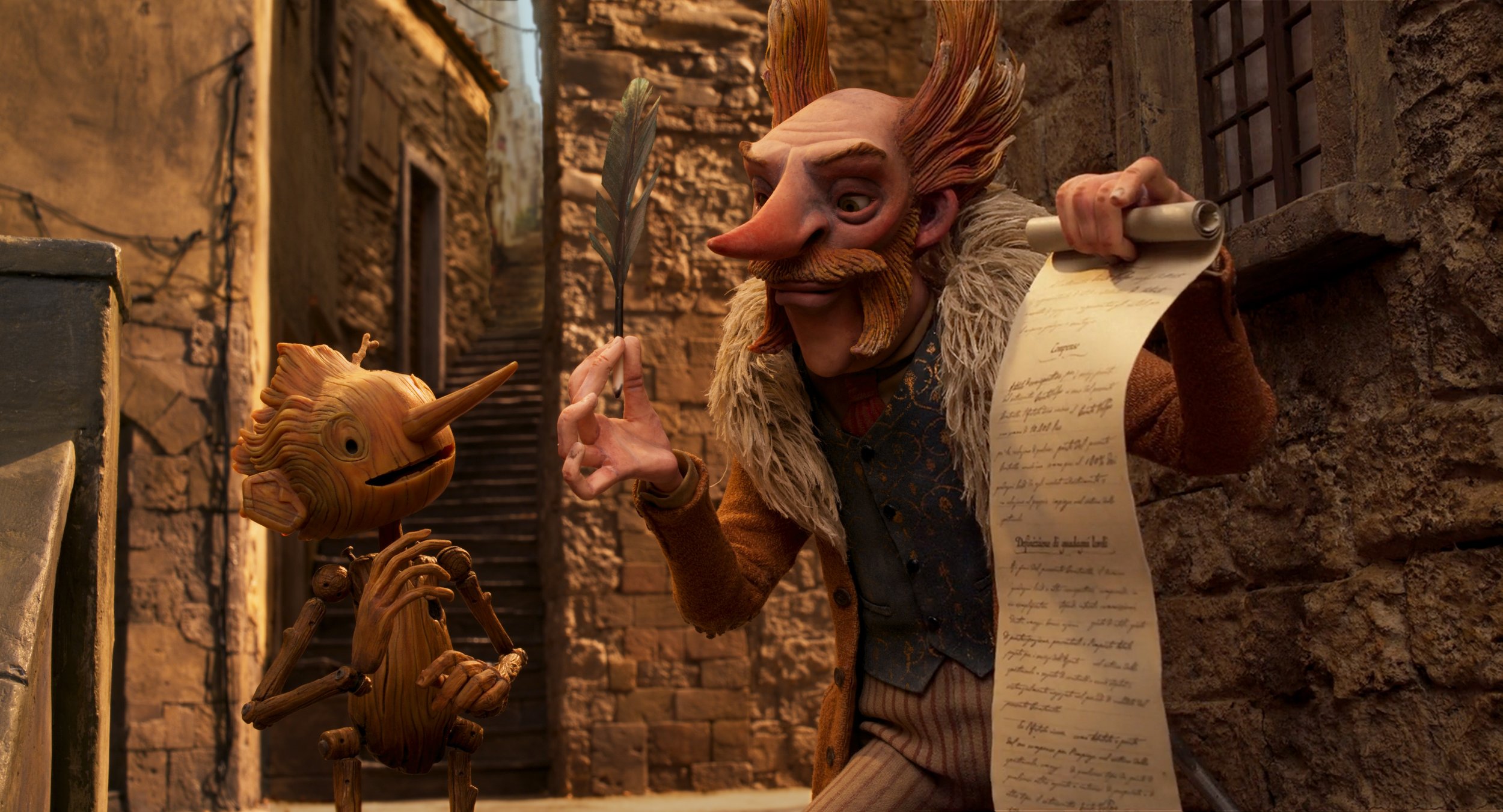Guillermo del Toro’s Pinocchio: Darker than Disney, a Fairy Tale Wrapped in Real-World Fascism
By Jim Slotek
Rating: B-plus
The title of Guillermo del Toro’s Pinocchio could easily be interpreted as short-hand for “this is so not Disney.”
Deeper, darker, mordant, with a definite horror movie vibe, it is what you might expect from del Toro, a filmmaker who gave us Pan’s Labyrinth – essentially a dark fairy-tale wrapped in real-world fascism, as this is as well. (This Pinocchio is also nominally a musical, which some might also find frightening).
Count Volpe (Christoph Waltz) offers a circus contract to Pinocchio (Gregory Mann).
Carlo Collodi’s 1881 novel obviously didn’t have Mussolini as a character, but in other ways, Guillermo del Toro’s Pinocchio serves the book’s surrealism well. There are trips to the Underworld. The “Blue Fairy” is a wood nymph who first appears as a swarm of glowing eyes and manifests herself as resembling a benevolent Gorgon. The “Terrible Dogfish” that swallows characters Jonah-like presents a more frightening image than any kaiju in Pacific Rim.
Even “Jiminy Cricket” – or Sebastian J. Cricket as he’s named here, voiced by Ewan McGregor – is kind of disturbing-looking. And he’s one of the good guys.
Del Toro’s imaginative and intelligent take is a palate cleanser after Robert Zemeckis’ ill-fated version in September, his umpteenth attempt to traverse the “uncanny valley” via CGI. Del Toro’s film uses stop-motion animation courtesy of the Jim Henson Company, and the effect is more impressionist than wannabe realist. Nonetheless, the humanity of the characters finds its way.
Guillermo del Toro’s Pinocchio opens as a tale of grief. Gepetto (voiced by David Bradley) is a widowed father and respected wood-carver in his Italian village, entrusted with rendering Christ Himself on the giant crucifix in the local cathedral. That honour, and the company of his young son Carlo (Gregory Mann, who also voices Pinocchio), provides the foundation for Gepetto’s happy life.
And then an Allied bomb literally drops on that life.
Drunk and despairing, Gepetto spends years at his son’s grave, under the shade of a tree that grew from the favourite pine-cone that was buried with Carlo (and which also provides a proper knot-hole office for Sebastian J. Cricket to write his memoirs). Jesus goes unfinished. (The Christian imagery is strong here.. There is another important Crucifixion-image later in the movie. And at one point, Pinocchio looks at the Christ carving and notes he is made of wood too. “Why do they love him and not me?”).
And then one day, in a fit of anguished fury, Gepetto chops down the tree and drunkenly carves it into a marionette in an attempt to bring his son back. While passed out, the wood nymph grants his wish, and conscripts Sebastian to become Pinocchio’s guardian on the promise of one wish when his task was over.
Given the seed-connection to Carlo, I half expected this Pinocchio to turn into Pet Semetary. But Pinocchio is his own pseudo-boy, a run-amok id doing what he feels like and declaring he’s “not a puppet!” And people see what they want in him. When he shows up in Church, he’s condemned as a demon. “Malocchio!” a parishioner screams at him. “No, it’s Pinocchio,” he answers, nonplussed.
Circus owner Count Volpe (Christoph Waltz) sees Pinocchio as his ticket to riches, as his puppet-master monkey Spazzatura (Italian for “garbage”) seethes. And the local fascist commander Podestà (Ron Perlman), realizing Pinocchio can’t die, imagines him as a possible super-soldier in Il Duce’s army.
As for Gepetto, he must wrap his head around the reality that Pinocchio is not Carlo and never will be. There are heady themes about death, Resurrection, and of course, truth-telling (lies practically make Pinocchio’s nose turn into tree limbs).
And, as mentioned, there are songs – only a handful, partly written by del Toro, with one of them, “Ciao, Papa” submitted for Oscar consideration. They are sporadic enough that, when someone starts singing, you’re reminded all over again that this is also a musical. A song-and-dance number that mocks Benito Mussolini to his face is a keeper.
Most of the themes will go over the heads of young children. But the bizarre imagery and fast pace should keep their attention. Older kids may have questions later.
Guillermo del Toro’s Pinocchio. Directed and co-written by Guillermo del Toro. Stars (voices) Gregory Mann, David Bradley and Ewan McGregor. In select theatres Friday, November 11. Debuts on Netflix December 9.



